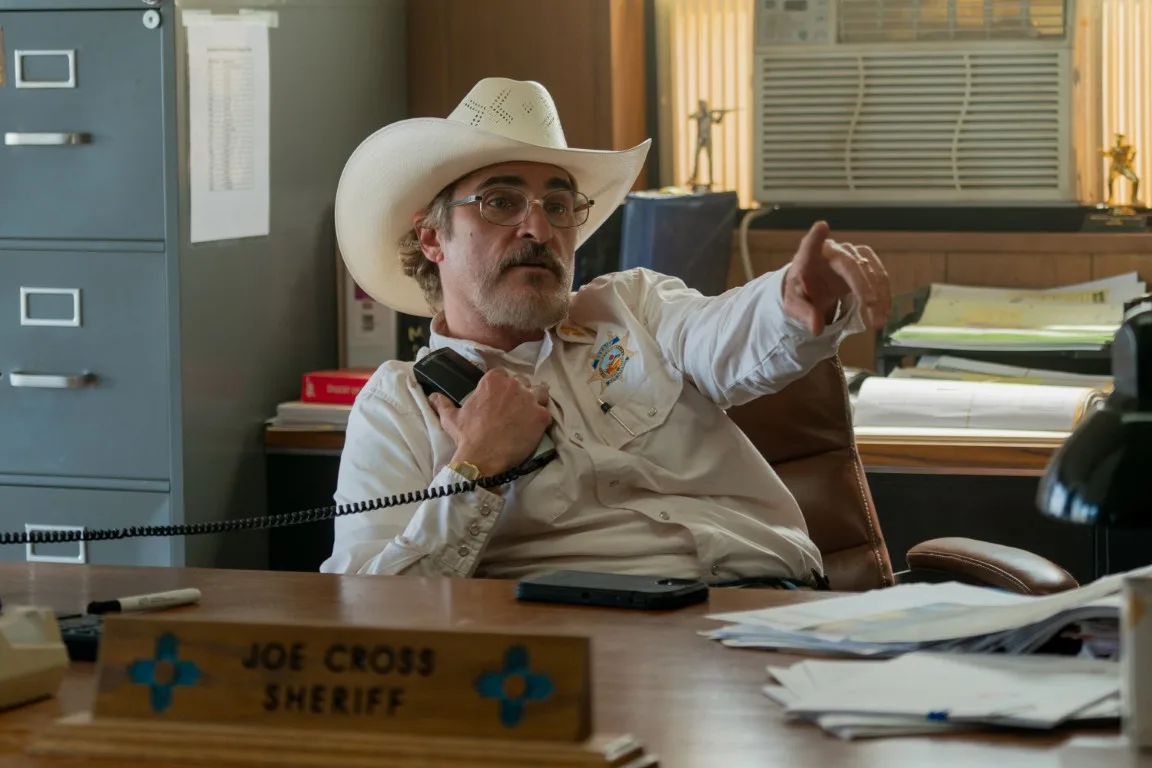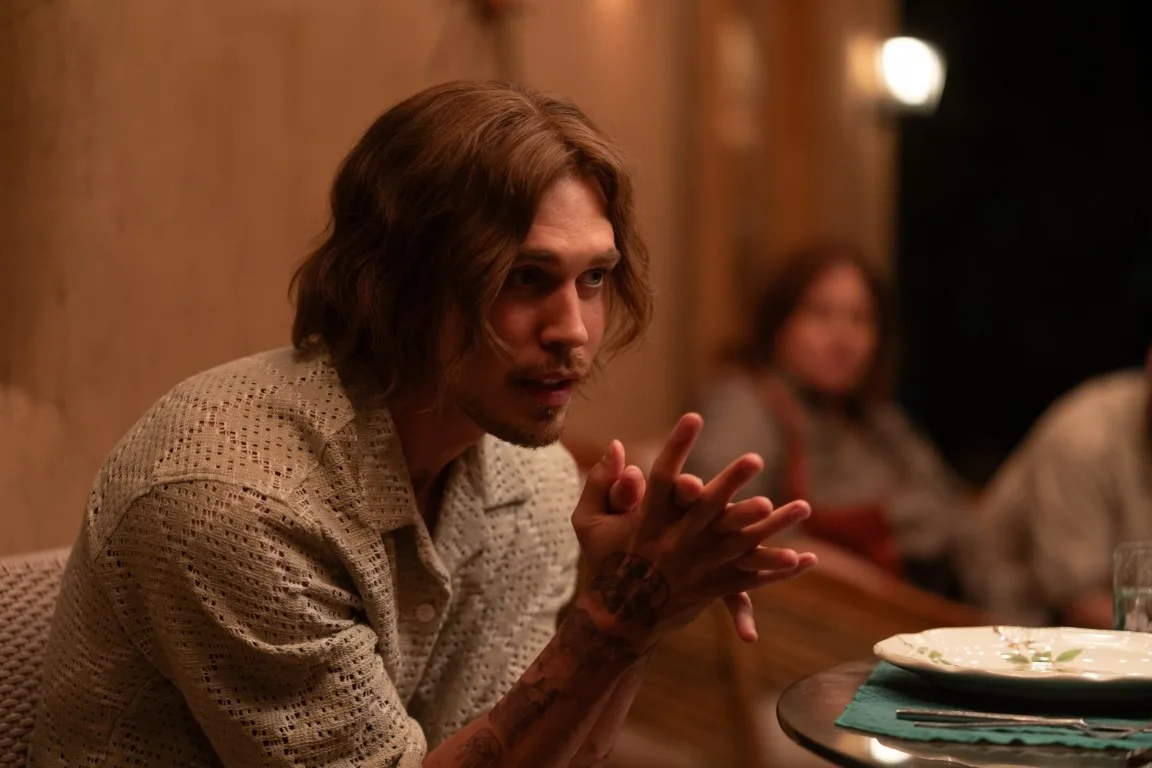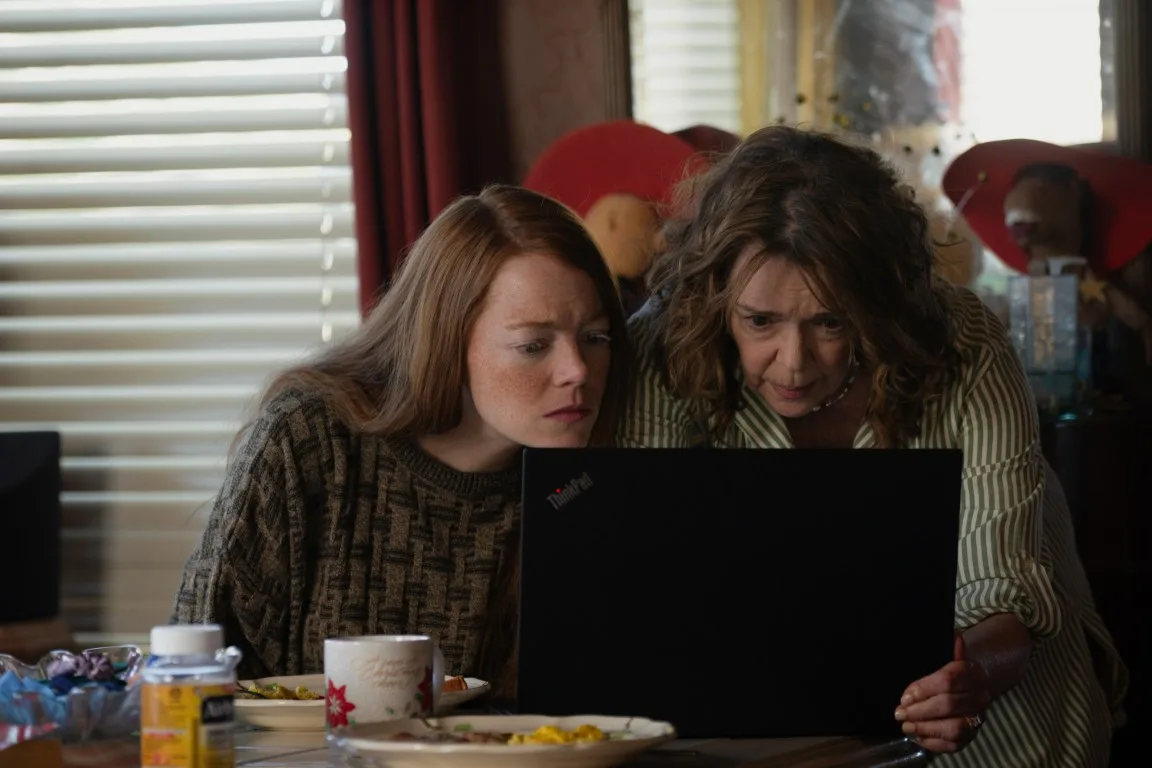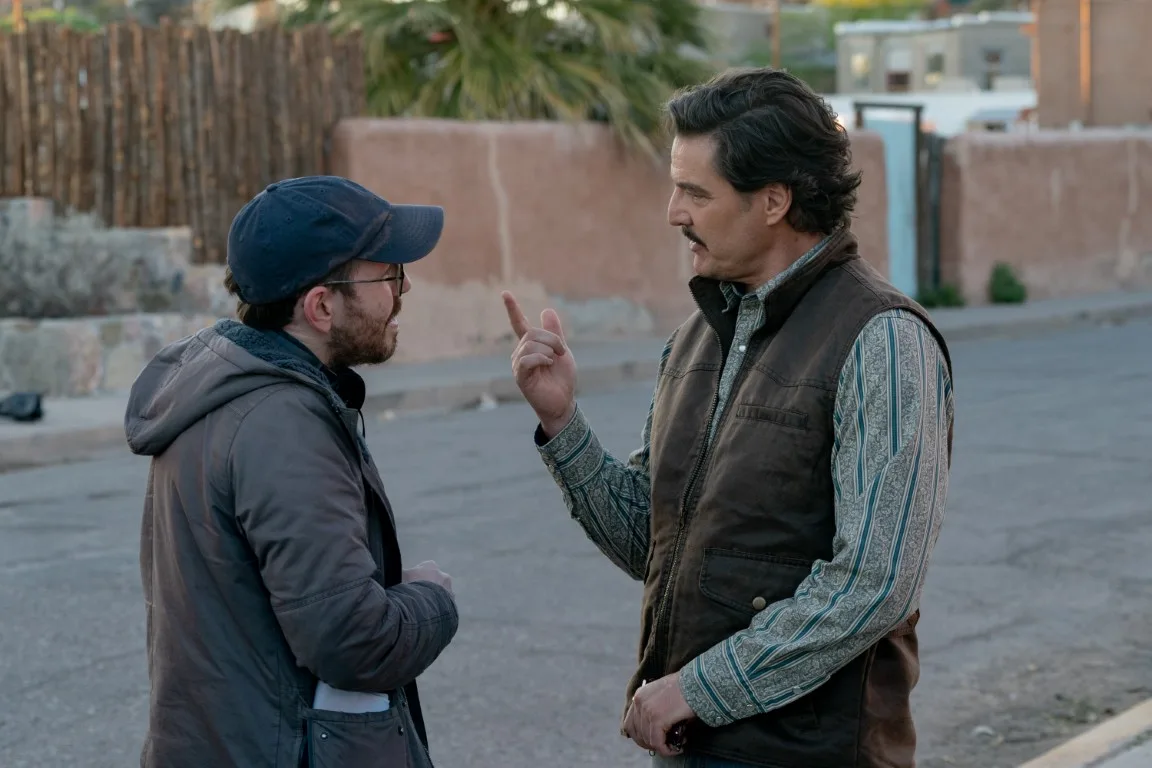It may be about time, or perhaps far too soon, to craft a movie that explores the realities of living through Summer 2020. Regardless, director Ari Aster’s pugnacious and genre-pliant “Eddington” is here, and it offers up the best approximation of the unique hell of that time.
Bristling with natural ease, Joaquin Phoenix plays Joe Cross, sheriff of the quaint town of Eddington, New Mexico, who rebuffs the mask mandates and 6 feet distancing that have become mainstays of his town. Skeptical of whether the virus exists and equally doubtful of whether its veracity is worth causing conflict between Eddington’s residents, a disgruntled Joe decides to run for mayor against incumbent Ted Garcia (Pedro Pascal). Cross’s act coincides with the divisions running rampant across the US at large, as Eddington’s youth begin to protest in the wake of George Floyd’s brutal murder, which puts them in conflict with the town’s meager but combative police force.
“Eddington” acts as Aster’s well-intentioned and imperfect attempt to make sense of the absurdity of life five Summers ago. As he wraps his creative arms around the political unwieldiness and racial tensions of the time, his reach may exceed his grasp, but that’s not a knock on Aster’s filmmaking skill as much as it is an affirmation that even nearly half a decade removed from lockdown, the world still hasn’t found a way to properly process the collective grief, estrangement, and alienation of that time. That the final product is divisively messy is more of a feature than a bug. COVID, as presented here, is the inciting force that shattered any semblance of unity in this country, breaking the last link to a democracy built on the consensus of the most fundamental truths.

Additionally, across his first three films, “Hereditary,” “Midsommar,” and “Beau is Afraid,” Aster has explored how the capitalist mindset has infected our rhythms of grief. Consider Annie’s (Toni Collette) monologue in “Hereditary,” where she mourns the “waste” of her daughter’s death because it didn’t, at the very least, bring her family closer together. In a world where jokes abound about the ways we have to “get ready for our 9-5 jobs” because we were “too shy to dance on TikTok in 2020,”—as if the disruption of the pandemic was something we had to “take advantage of” instead of just survive—the film is a mournful reminder that the no one was ever equipped to endure the level of tragedy caused by COVID, let alone process it perfectly. When tragedy becomes insurmountable, we often return to the well of capitalist thought to similarly “not waste” our suffering. “Eddington” condemns those defaults while wondering if there’s a better way forward.
Speaking of the ways the characters of Eddington live so proximate to each other yet could not see the world more differently, Aster told RogerEbert.com, “all of these people are kind of living on the Internet and they are sort of all seeing the world through these strange, individualized windows.” Indeed, Aster’s worry is not just that we live in a world divided; there’s a paucity of concern, let alone curiosity, about attempting to mend the split or learn from the past. “Eddington” serves as a poignant and emphatic call for embodied engagement with one another, amidst the temptation to retreat behind a digital veneer.
Ahead of a sold out advance screening of the film at the Music Box, Aster jumped on the phone for a few minutes to discuss his prevailing interest in dolls throughout his filmography, the ways popular music precede moments of violence in his projects, and how the movies—despite being on screens—may be the thing that help us learn to reconnect with each other.
This conversation has been edited and condensed for clarity. This interview contains mild spoilers for “Eddington.”
To jump back a bit in time: I know you had toyed with the idea of making a Western for your debut, some eight years before you made “Hereditary.” Watching “Eddington” in its final form now, though, it’s hard for me to believe that a version of this story could have existed since the provocations and questions are so specific.
To be honest, the original version of this wasn’t the most interesting. I grew up in New Mexico, and my family still lives there. For a long time, I’ve always wanted to make a story set there, and I had written something that was something of a Western that was about two feuding locals. I lost interest in it though after failing to get it made, and then in the early Summer of 2020 when I was writing this story, I realized that the basic structure of that old script–with its emphasis on the siloing of communities and breakdown of communication–would be a decent kind of framework for a movie about COVID. Joaquin’s character–even his wardrobe–is modeled after one of the sheriffs I interviewed in preparation for this project.
On the note of filling out a framework, you populate your films with characters who are looking for vessels to house their pain. There were dolls in “Hereditary,” and also Emma Stone’s Louise–who plays Joe’s wife–uses dolls to cope with trauma in “Eddington.” What draws you to dolls and figurines as mediums and siphons?
I do like dolls–I designed the ones you see in “Eddington”–and find that craft quite fun. It made sense to include them in “Eddington” because Joe doesn’t have access to Louise in the film. Because the audience is aligned with Joe, we likewise don’t have access to her that we might want or need to fully understand her. For me, a lot of her history and the trauma that she’s processing and trying to work through are evident in the art that she’s making.
I view Louise as someone who was probably put through art therapy at a certain point in her life, and is somebody who has a history of abuse, and those experiences have left her confused. Over the course of the film, we find that she’s being manipulated by Austin Butler’s character, which adds another layer to her attempts to process. Ultimately, though, her artwork was a way of painting a picture of her inner self, from her emotions to her imagination, given that she’s somebody who is removed from us.
Phones in this film, but also writ large, act as a home for humanity’s worst impulses and attempts at processing affliction. Maybe we should switch to doll making.
Well, I tried not to judge any of the characters. If anything, I was trying to pull back as far as I could and provide the broadest possible picture of the landscape. I don’t mean just the physical landscape of the town, but rather also a sense of the ideological sense of the community. All of these people are kind of living on the Internet, and they are sort of all seeing the world through these strange, individualized windows.

Speaking of the Internet, at Cannes, Austin Butler shared that in the early discussions with you, he approached playing the cult leader, Vernon, as if he were “the embodiment of the Internet.” It’s not lost on me that this religious language is grafted onto this internet surrogate, which correlates in some ways with your reflection of how those ushering in AI talk about it like it’s a God. Was that an intentional parallel?
Vernon is a Pied Piper figure. He’s someone who sees what is happening, especially in America, and is capitalizing on it; there’s no telling how sincere he is. I’ve talked to some people who saw the film, and they viewed him as being sincere, which I found very interesting. But he is someone who, in some ways, collects people. Louise is somebody who has a very ugly history, and he’s providing her with answers. Really, in the end, he’s a salesman, and he’s a good one.
Very much like a traveling preacher in some respects. I noted how Katy Perry’s “Firework” here operated similarly to No Genre’s “Sledge Hammer” and Modeselektor’s “Dark Side of the Sun” in that these songs not only evoke the tortured interiority of your protagonists but often precede moments of violence.
It’s funny because the first song that we used there was Jay-Z and Alicia Keys’ “Empire State of Mind.” That really made me laugh, given that it’s a New York anthem that’s being played at this fundraising party in this tiny town of New Mexico.
We weren’t able to secure the rights, and I really wasn’t expecting to because it’s such a huge song, but then we spent a lot of time experimenting with different songs in that scene, and “Firework” just fit.
I didn’t know it after all my years of listening to it, but Perry was inspired, in part, by Jack Kerouac’s “On the Road” for that song. “Firework” is just as Americana as “Eddington.”
That’s interesting. I didn’t know that. In the end, I was just trying to find a song that felt emblematic of the culture and sounded like American pop music right now, which, as a genre, has a sound that hasn’t changed in a long time. It’s a great song, and it evolved perfectly with the scene. It’s a song that’s very heavy on the bass, and that was important because we cranked the bass in that scene so that you would feel it in your chest and your stomach. When you push the bass on that song, it makes it queasy, which worked for my purposes.
I hope the official soundtrack comes with the bass-boosted remix of “Firework.” You’ve cited Nietzsche, and how we’re living in a time now where the oversaturation of our history leads to detached spectatorism instead of actual engagement. Where do you see the role of cinema as a way to help people re-engage with each other?
I appreciate that. There are a lot of movies, more on the tentpole side, that encourage a retreat from reality. Even thinking about social media, that’s designed for a type of disassociated consumption. Hollywood has always been about escapism, and I believe in escapism; I hope my movies are fun and enjoyable, and don’t just feel like work.

Thinking of what Roger Ebert said about movies being empathy machines, the medium of cinema can be a way to foster a more intentional engagement than the way something like doomscrolling might do.
The thing is, I don’t see movies as the problem, for those reasons you described. I see something insidious about the way social media works, and in the way it keeps you siloed off from your neighbors, and just the way it functions as an echo chamber. The reasons for this system are not particularly sinister, but the results are. Social media is all about keeping your engagement and attention, which is how money is made. Our minds have been somewhat colonized, and so, if anything, part of making “Eddington” was about underscoring just how divided all these people are and how artificial the process of connecting through the screen is. It’s also kind of about how the virtual tends to make reality more fake. This is what it means to be a people who live on the internet.
What you’re saying reminds me in some ways of the ending of a film you produced: Kristoffer Borgli’s “Dream Scenario,” where our very dreams become invaded with unskippable ads; there’s this sense that once we commercialize that space, we can become further siloed in our sleep.
Yeah … that’s sort of our situation right now. I think any film that’s trying to achieve any sort of modern realism has to contend with our division and how those voids are only getting wider.
“Eddington” opens in theaters on July 18th from A24.












